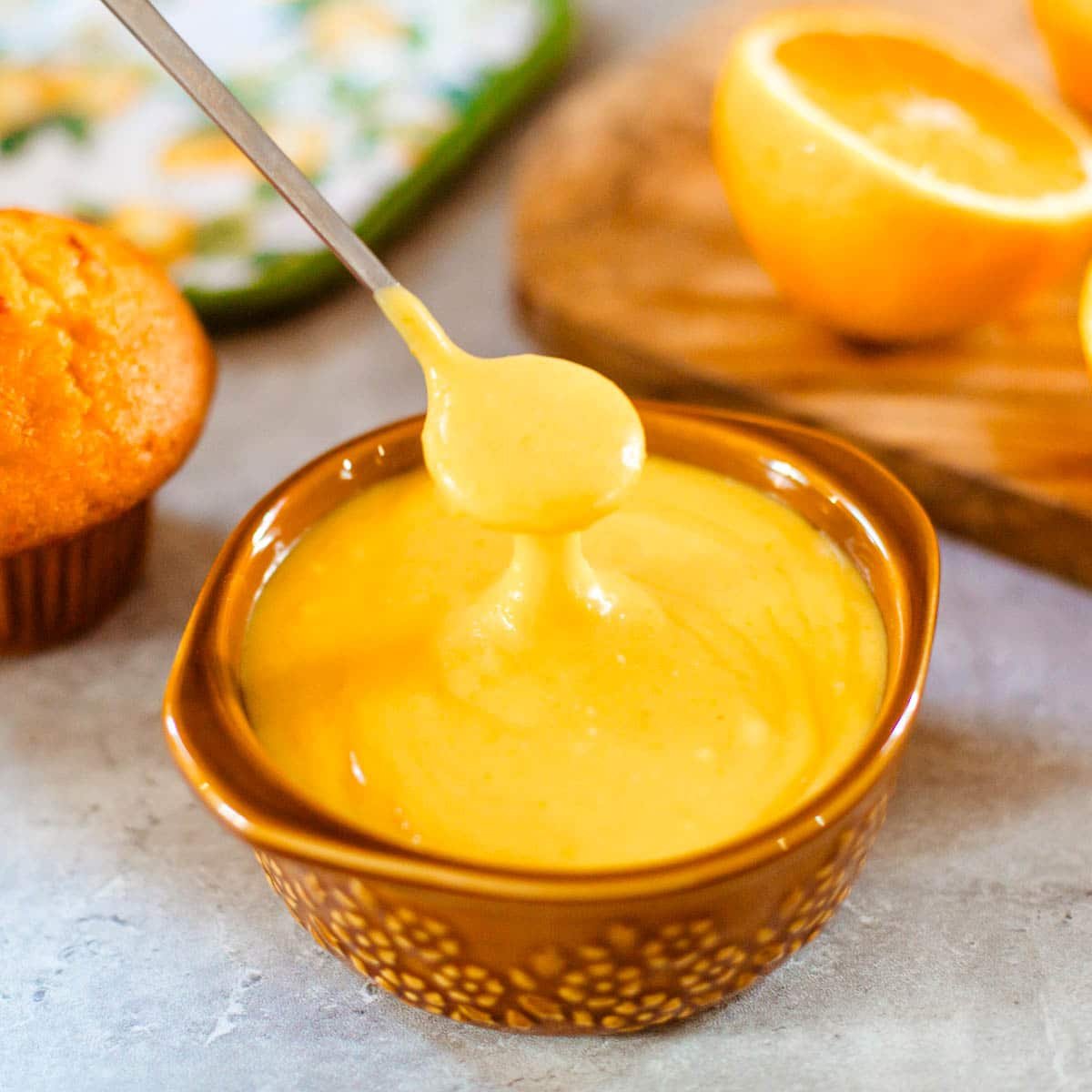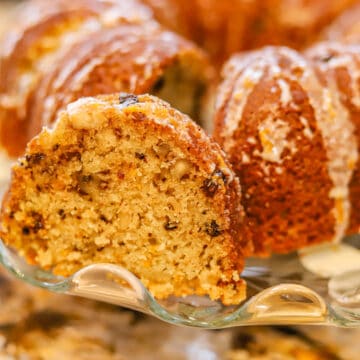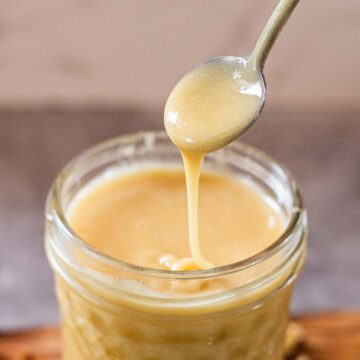This Orange Curd Recipe is as decadent as it is simple, requiring only a handful of ingredients, and it's gluten-free! Enjoy it on its own or spread it on pancakes, cookies, or these delicious Lemon Blueberry Scones!

This homemade orange curd recipe is an impressive yet simple spread you can use to sweeten breakfast, desserts, and more! It's similar to lemon curd, which is often served at high tea, along with scones and clotted cream.
While this recipe requires a bit of focus to make properly, it's not a hard technique to master! If you've ever made a hollandaise sauce, this is a somewhat similar process. Even if you haven't, I know you can do it!
Jump to:
😍 Why You'll Love This Recipe
- This is an easy orange curd recipe anyone can master.
- No need to add pectin, starch, or flour to this recipe! You can get a thick, creamy curd with just a few simple ingredients.
- Orange curd makes a great gift!
🔖 Ingredients & Substitutions

- Oranges: You can use regular navel oranges, Cara Cara oranges, blood oranges, or any type of orange you prefer!
- Egg yolks: Some recipes call for the whole egg, but we just need the yolks of 3 large eggs! No substitutions!
- Sugar: Granulated white sugar works best.
- Salt: Fine sea salt or iodized salt.
- Unsalted butter: If you must use salted butter, omit the additional salt.
- Lemon juice: Fresh is best, bottled is fine.
- Rosemary (optional): I like to add a fresh sprig of rosemary for the last five minutes of the cooking process to infuse the curd with a slightly herbal flavor to complement the sweetness of the oranges.
*A full list of ingredients can be found in the recipe card.
🍊 How To Make This Recipe
Step 1: Pour sugar and salt into pot or saucepan, along with 4 tablespoons freshly grated orange zest, and whisk to combine until the texture resembles wet sand.


Step 2: Separate five eggs and save the egg whites for another use. Add yolks to the pot along with 1 cup freshly squeezed orange juice and ¼ cup lemon juice. Whisk until combined.


Step 3: Place the pot on the stove over low-medium heat. Whisk or stir with a rubber spatula continuously until the orange curd begins to thicken. This should take 10-15 minutes.


Pro Tip: It's important to continuously stir the mixture and keep the heat relatively low so the egg doesn't scramble!
Step 4: When the curd begins to thicken, add a small sprig of fresh rosemary and continue stirring for an additional 5 minutes or until the curd is thick enough to coat the back of a spoon.


Step 5: Slice butter and place it in a small bowl, then pour curd through a sieve or fine-mesh strainer into the bowl. Use a rubber spatula to push it through the strainer. Whisk together until butter is melted.


Pro Tip: Make sure the butter is cold! Room temperature butter won't thicken and cool the curd as effectively, which won't yield that dazzling, glossy shine all good curds have!
Would you like to save this recipe?
Step 6: It's okay if the texture is a little runny, as it will thicken more as it sets. Place a sheet of cling wrap over the bowl and let it thicken in the fridge for an hour before enjoying.


Pro Tip: Press the cling wrap into the bowl so it makes contact with the curd, forming a seal. If you're storing it in a jar or Tupperware, make sure it's air-tight or the curd may harden and dry out.

🍪 Serving Suggestions
Not sure what to do with your gorgeous and flavorful orange curd? Here are some of my favorite ways to enjoy it.
- Spread over waffles, mulberry muffins, bagels, fig scones, or toast
- Use it to fill pfannkuchen (German pancakes), crepes, pies, and fruit tarts
- Use it as a topping for this limoncello cheesecake, drizzle it on ice cream, or use it as a cake filling! It also makes a good substitute in this lemon curd cake.
- Eat it with a spoon (yes, it's that good!)
🍯 More Sweet Spreads
If you liked this orange curd recipe, here are some more sweet spreads you can try!
- Strawberry Rhubarb Jam
- Fuyu Persimmon Preserves
- Simple Elderberry Jelly
- Plum Preserves & Jam
- Quince Jam (Preserves)
🤷🏻♀️ FAQs
Orange curd, like lemon curd, is made with butter, sugar, egg yolks, and citrus juice (orange juice, in this case).
Orange curd and marmalade are different spreads! Marmalade is made using orange peel, sugar, and water, whereas curd also contains dairy and eggs and is made using the fruit's juice, not the peel.
👩🏻🍳 Pro Tips
- You can also make this recipe with lemons, of course, or use a combination of half orange juice and half lemon juice. You can even try your hand at lime curd!
- Cooking times will vary, so if your curd is thickening faster than mine did, you may have to make adjustments.
- You technically don't have to strain it if you prefer to leave in the orange zest for added texture, but curds are usually smooth.
- Orange curd is typically served cold, but you can reheat it over the stove (stirring continuously). I wouldn't microwave it, as you risk cooking the egg.
- If the orange curd solidifies in the fridge (or freezer), leave it out at room temperature until it becomes soft enough to re-whip.
- Store orange curd in a mason jar or an airtight container in the fridge for up to two weeks, or in the freezer for up to a year.
- Orange curd will last longer if stored in a sterilized jar. Make sure not to cross-contaminate when serving yourself!

🍽 Related Recipes
Did you make this recipe?
📖 Recipe

Decadent Orange Curd Recipe
Ingredients
Equipment
Method
- Pour sugar and salt into pot or saucepan, along with 4 tablespoons freshly grated orange zest and whisk to combine until the texture resembles wet sand.
- Separate five egg and save egg whites for another use. Add yolks to the pot along with 1 cup freshly squeezed orange juice and ¼ cup lemon juice. Whisk until combined.
- Place pot on the stove over low-medium heat. Whisk or stir with a rubber spatula continuously until orange curd begins to thicken. This should take 10-15 minutes.
- When the curd begins to thicken, add a small sprig of fresh rosemary and continue stirring for an additional 5 minutes or until curd is thick enough to coat the back of a spoon.
- Slice butter and place in a small bowl, then pour curd through a sieve or fine-mesh strainer into the bowl. Use a rubber spatula to push it through the strainer. Whisk together until butter is melted.
- It's okay if the texture is a little runny, as it will thicken more as it sets. Place a sheet of cling wrap over the bowl and let it thicken in the fridge for an hour before enjoying.
Nutrition
Notes
- It's important to continuously stir the mixture and keep the heat relatively low so the egg doesn't scramble!
- Make sure the butter is cold! Room temperature butter won't thicken and cool the curd as effectively, which won't yield that dazzling glossy shine all good curds have!
- Press the cling wrap into the bowl so it makes contact with the curd, forming a seal. If you're storing it in a jar or Tupperware, make sure it's air-tight or the curd may harden and dry out.
- You can also make this recipe with lemons, of course, or use a combination of half orange juice and half lemon juice. You can even try your hand at lime curd!
- Cooking times will vary, so if your curd is thickening faster than mine did, you may have to make adjustments.
- You technically don't have to strain it if you prefer to leave in the orange zest for added texture, but curds are usually smooth.
- Orange curd is typically served cold but you can reheat it over the stove (stirring continuously). I wouldn't microwave it as you risk cooking the egg.
- If the orange curd solidifies in the fridge (or freezer), leave it out at room temperature until it becomes soft enough to re-whip.
- Store orange curd in a mason jar or airtight container in the fridge for up to two weeks, or in the freezer for up to a year.
- Orange curd will last longer if stored in a sterilized jar. Make sure not to cross-contaminate when serving yourself!






Comments
No Comments